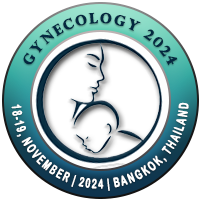
Shahnaz Taing
GMC, IndiaTitle: Antepartum transabdominal amnioinfusion in oligohydramnios - a comparative study
Abstract
The purpose of this study was to evaluate the role of antepartum transabdominal amnioinfusion in oligohydramnios with the view to improving pregnancy outcome in oligohydramnios, a serious complication of pregnancy that is associated with a poor perinatal outcome and complicates 1-5% of pregnancies. Methods: The study comprised of a prospective analysis of 130 pregnant women with oligohydramnios, divided into two groups, the study and control group of 65 patients each and were similar with regard to age, gravidity, parity, gestational age. TAA was performed on all patients in the study group and the results were compared and analyzed. Results: Mean gestational age at first treatment was 29.98 weeks in study group. Mean pre-procedure amniotic fluid index was 4.01 and post-procedure was 12.49. A total of 106 infusions were done on 65 patients (mean1.63). Mean latency period in study group was 49.53 and in controls 26.49. There was significant decrease in fetal distress in patients in study group. 30 % of patients needed caesarean section in study group compared to 60% in controls. Number of preterm deliveries was 18 and 45 respectively in study and control groups. 61% of newborns in the study group weighed more than 2.5 kg compared to only 24% in control group. Neonatal ICU admissions and newborn deaths were lesser in study group. Conclusions: Transabdominal amnioinfusion is an extremely useful procedure to reduce complications arising from oligohyramnios. It significantly increases the latency period, decreases the occurrence of fetal distress preterm deliveries, need for caesarean or instrumental deliveries, improves birth weight of the newborns and significantly reduces the neonatal morbidity and mortality.
Biography
To be updated.

